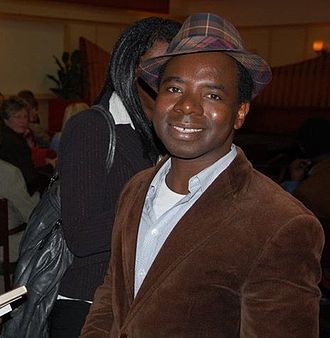Eighteen established writers, one from each city/region, will be commissioned to write a chapter in a response to their Arts & Society theme within the context of their city.
Just as Ulysses is innovative in its form and language, so the writers will be chosen with a view to reflecting a breadth of genres, styles and innovations. Each writer will ideally attend their own city’s event. All the (new) chapters from the 18 cities/regions will be brought together in a book publication: ULYSSES European Odyssey.
Vamba Sherif will write the Leeuwarden chapter
Writer’s Statement
I came upon Joyce by chance after I have moved as a teenager from Liberia to Kuwait where I went to secondary school. I was fortunate that the first work I read was The Dubliners, his most accessible of works. It prepared me for his masterpiece Ulysses. But when I was commissioned to respond to the Nausicaa episode of Ulysses – a privilege that I simply could not refuse – I found myself struggling with the form and content of such a response. From the beginning, I knew that the key to my response, whatever form it would take, would have to involve what I believe is the essence of the Nuasicaa episode: Bloom seeing Gerty Macdowell and she being aware of his presence. The tension in this encounter would form the key to my response. But how to go about achieving that goal? The breakthrough came when I remembered a famous saying by Joyce: ‘Imagination was memory.’ That’s when I decided to play with the real and the imagined, with the novelist Joyce and the fictional Gerty Macdowell and her response to Bloom, and attempting to connect all that to this time and century in which I live in. With that discovery, the writing became easy, free of constrictions, as free as Joyce when he allowed his imagination to play with the memory of his life in Dublin. Dublin became my Dublin, Joyce my Joyce.
Writer’s Biography
Author Vamba Sherif is primarily known as a novelist, but has also contributed stories and journalistic pieces to publications such as The New York Times, the French magazine Long Cours (a subsidiary of L’Express), the German magazine Kultur Aaustauch, and various Dutch newspapers and magazines including Trouw, De Volkskrant, One World, and others. The author also occasionally explores acting and has a great passion for films, some of which he reviews on a monthly basis.
Born in northern Liberia, Vamba’s family included members from different parts of West Africa, including Liberia, Sierra Leone, Guinea, and Mali. As a result he grew up speaking languages such as Gbandi, Kissi, some Lomah, and Mende, which is spoken in Sierra Leone. His mother tongue is Mande or Mandingo, variations of which are spoken in Mali, Guinea, Sierra Leone, Ivory Coast, Burkina Faso, and Senegal. Vamba grew up in a family that valued scholarship and he was surrounded by books. He learned Arabic and English at an early age. Moving to Kuwait as a child broadened his awareness of the world’s diversity. Vamba lived in a neighbourhood with people of many nationalities and attended secondary school with students from countries such as The Maldives, India, Malawi, America, Palestine, Jordan, and Ghana.
While in Kuwait he discovered world literature, reading dozens of novels from The Heineman African Writers’ Series and immersing himself in the works of Chekov, Tolstoy, and Stendhal. He was amazed that a writer could evoke an ancient world as vividly as Flaubert did in Salambo and wrote long letters home in Arabic about his experiences living in a desert city-state and his fascination with life as a migrant in a wealthy country, exploring themes such as Arab hospitality and poetry. The first Gulf War forced Vamba out of Kuwait and into The Netherlands, where he studied law and improved his skills as a writer. It was in Europe that he became acutely aware of his outsider status being an exile from a country at war. The author’s quest for answers regarding his identity and the civil war in his country led him to write his first novel, The Land of the Fathers, a work exploring the founding of Liberia by freed blacks from America in the nineteenth century.



